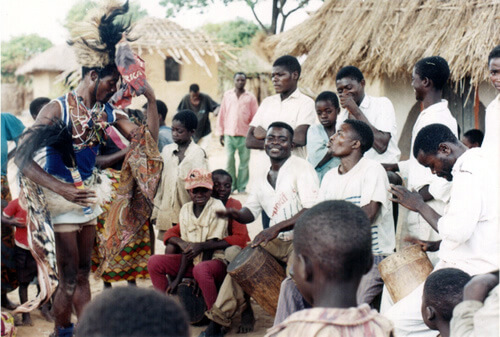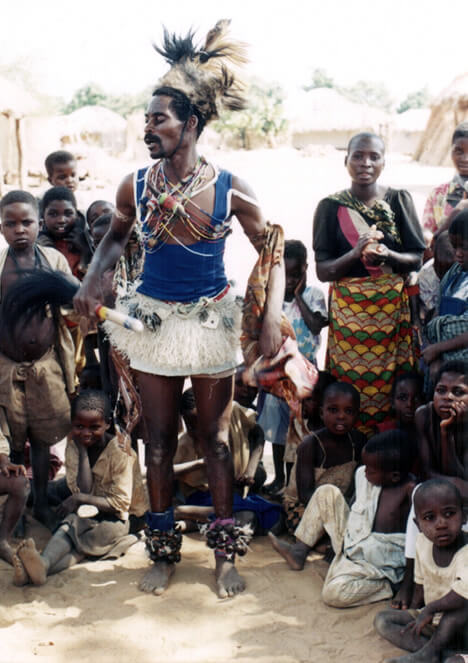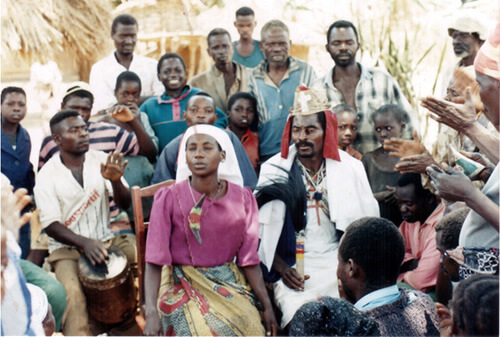An Exorcism in Zambia
Working Together to Solve a Problem...and Celebrate Life
Article and Photos by Guy William Volk

|
|
Mr. Phiri, a n’ganga, dances to the rhythm of drummers in Zambia.
|
Doctor David Livingstone had many ambitions when he set out to explore Africa. A doctor and anti-slave crusader, the goal dearest to him was to enlighten what was then considered the "Dark Continent" through Christianity. In large measure, he succeeded at what he set out to accomplish. For example, today, three-quarters of Zambians call themselves Christian. While there are numerous churches in the country, many Zambians remain superstitious, believing that the n'ganga — the witch doctor — will cure them if the clinic cannot. In short, they worship Livingstone's God, but they clutch onto Mother Africa's muti (witchcraft) in case He fails.
I had lived in Chimtembo for two years while volunteering with the Peace Corps, teaching sustainable sanitation methods. Although my roosters crowed each morning at four, I rarely rose before six, making me among the last in the village to do so. It was common for me to open my door and see men drinking masese — a type of beer made of fermented maize — from a communal gourd. However, this morning, those passing the gourd were grandmothers or agogos.
In my mud house, I chomped bananas for breakfast. The volume outside grew. I checked the beer circle and noticed several older men — madalas — had joined the group. An older woman painfully dragged two rickety chairs to the center of the village. Teenage boys in tattered clothes plodded into the village; the youngest boys carried worn drums. The older boys headed for the masese while the younger ones gathered near the chairs, thumping the drums and warming their cold skins. It was nine in the morning.
The boys created a solid rhythm with the drums. An agogo led a woman in a purple shirt to the chairs. She wore a white cloth on her head, like a nun's habit. The women and girls formed a circle around the chairs and started singing. The men loitered at the circle's fringes, looking in.
The agogo held the gourd overhead, sang a few lines and other women ululated. The sound seemed like a clutch of drowning hens. Then, gourd still raised, the agogo exited the village. Trailing her, the group — everyone clapping and singing — snaked out behind her.
Suddenly: "Odi?" ("Is anyone home?") Robert had arrived to say good morning.
"Mwauka uli?" I asked him. "How have you awoken?"
"Nauka makola" ("I awoke well"), he answered, even though I knew he had slept on a thin reed mat on a hard mud floor.
"Robert, the agogo's beer is ready. Will you be drinking?" I asked playfully. Robert never drank.
"Ah . . . no." He laughed and shook his head. "Do you know why they're drinking?" he asked. It was my turn to shake my head.
"That woman had a dream last week. In her dream, her ancestors told her she must brew beer. If she refuses, they'll haunt her. Now, they've gone to the cemetery to make an offering. When they return, the n’ganga will perform an exorcism. Have you ever seen an exorcism?” I shook my head again.
"The n’ganga will be here soon,” he said, as he left to work his field.
Twenty minutes later, the group returned. Three boys scooped up the drums and began thrashing. The woman in purple took her seat; the group engulfed her.
Mr. Phiri ("Mr. Mountain") was a small man, but the respect he commanded was as large as his name suggested. His hair was rough and thick, like used steel wool. His limbs were thin but not scrawny; decades of subsistence farming had formed veiny, taut muscles. Phiri's most striking feature was his left eye. Near the tear duct was a finger-sized gouge, dropping diagonally into his skull. His eye was functional but contorted; he appeared to be looking inside himself, checking an inner guide. A childhood accident involving a bicycle, a rock, and a spear had left this wound. Someone told me that he started having visions after returning from the clinic. Humble when we passed on the road this morning, he was the center of the action.
Phiri had wrapped bark around his head and from the back, guinea fowl feathers shot into the air. He wore a blue mesh tank top with fraying white seams. He had dozens of beaded necklaces draped around his body. He held a foot-long stick with black hair sprouting from one end; it looked like a narrow feather duster. He wore very short, very tight, pink cut-off shorts. Over them, he wore what appeared to be a white tennis skirt. And over the skirt, he wore something resembling a luau skirt fashioned from shredded maize sacks. Around his ankles were leather strips loaded with jingly bells. When he walked, the feathers on his head waggled, and the luau skirt trailed behind like stunted tail feathers. To me, Phiri was a grotesque, broken bird. To my neighbors, he was their spiritual connection, ready to channel the dead.

|
|
Phiri, a n’ganga, is about to initiate an exorcism.
|
The ancestors of the modern Zambian believe Chauta created all living things on a mountaintop during a thunderstorm. Today, they consider dancing a spiritual phone line between the living and the dead. Through this physical, joyful activity, the mortal and the eternal communicate. Phiri was the divine link ready to dial the dead. Despite my skepticism, I felt a divine tug. I rushed to the group. The boys flogged the drums; we sang and clapped. One moment, Phiri was motionless, mortal. The next, he was the n'ganga, flailing wildly.
As the pounding of the drums filled the village, the n'ganga rapidly picked up and set down his feet: little karate chops on the ground. The bells on his ankles clanged wildly. The beads around his neck clacked like desiccated metacarpals. The feathers on his head shook violently. Despite all the motion and sound, though, his face remained focused. With his introspective left eye trained in and down, he looked deep into his soul, searching for the woman's ancestors.
The dust was so thick it looked like Phiri's feet smoldered. Girls clapped so hard I thought their hands would bleed. Women sang, pleading with the dead to remain in the afterlife. Unable to restrain myself, I joined them. Even though it was the "woman's role," I ululated, too. The men watched the n'ganga cautiously as older men watched a new gardener.
The woman in purple sat on the chair, her body writhing. Suddenly, Phiri seated himself next to her. He produced a white cape and a crown with red flaps covering his ears from nowhere. On the crown was a four-inch cross, glued akimbo. Wearing a cape and crown, grasping his stick with the black hair, he appeared regal. As he sat, he preached calmly, like a high school chemistry teacher explaining the rules of the lab for the hundredth time. Occasionally, Phiri passed the stick near the possessed woman as though he were an elderly curator, lovingly dusting a sacred object. She quivered whenever it passed near her like an older woman registering a chill. As quickly as he had sat down, Phiri leaped to his feet and renewed his frenzied tarantella.

|
|
Phiri sitting next to a woman in purple during the exorcism ritual.
|
Over the years, Zambians have informed me: "This small bag is filled with a plant that snakes hate. When they smell it, they run in fear!" To them, the world is full of magic. During the exorcism, I looked for sinister clouds to roil and cover the sky. I waited for Phiri to bend over a boiling cauldron and add a toad, a bat, and guts. It never happened. For all the talk about spells and powders in Zambia, Phiri's witchcraft was remarkably simple. He danced. He spoke. He danced again.
Finally, the woman in purple collapsed, her chest on her lap, fingers scraping the ground. The drums stopped. The crowd parted. The agogo approached and pulled the woman to her feet. The agogo put the exhausted woman's arm around her shoulders, and they lurched home, past smiling elders, satisfied with the n'ganga. I heard "Nchito makola" (good work) mumbled repeatedly.
That day, I participated in a ceremony that spanned centuries. Despite my skepticism, I helped my neighbors communicate with their dead relatives. Through the n'ganga, we had broken through the ether separating the departed and asked for forgiveness. Evidently, it worked: the people of Chimtembo informed me the dead had agreed to stop tormenting the woman. I believed them, although I was unsure exactly how they knew.
In the course of the Gule Wamkulu (the Great Dance), the living and the dead had exchanged messages, and the n'ganga had been the messenger. Over the years, I had dismissed witchcraft as bogus, a fraud to impose upon the frightened and the frail. However, when I saw how Phiri's brand of magic brought my neighbors together, I realized only some muti were magic wands or midnight spells. Phiri's muti was about working together to solve a problem, joining your community, and making something happen.
More than anything: it was about celebrating the life you had.
Guy William Volk (Willy) volunteered for the Peace Corps from 1998 to 2001, teaching rural Zambians safe hygiene and sanitation techniques. After earning a master's degree and serving as a temporary duty officer for the U.S. State Department in Malawi, he moved to Palm Beach County, FL.
|
